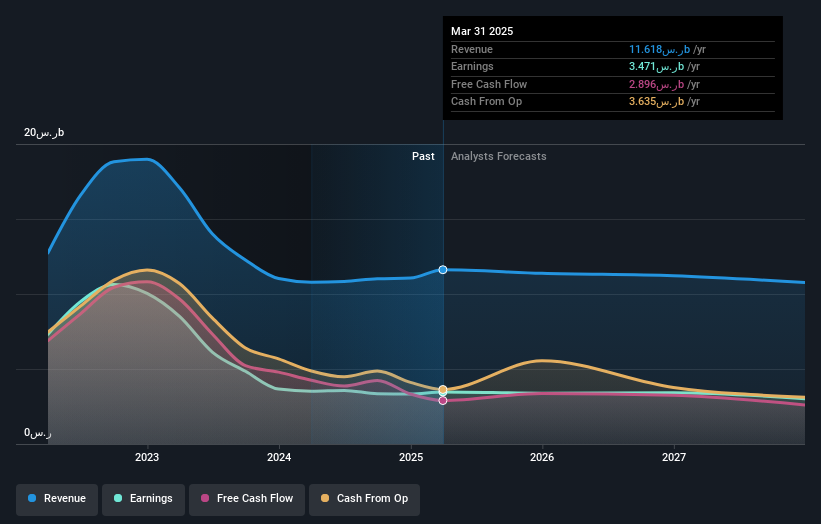- Saudi Arabia
- /
- Chemicals
- /
- SASE:2020
Individual investors own 43% of SABIC Agri-Nutrients Company (TADAWUL:2020) shares but public companies control 50% of the company

Key Insights
- The considerable ownership by public companies in SABIC Agri-Nutrients indicates that they collectively have a greater say in management and business strategy
- 50% of the company is held by a single shareholder (Saudi Arabian Oil Company)
- Ownership research along with analyst forecasts data help provide a good understanding of opportunities in a stock
Every investor in SABIC Agri-Nutrients Company (TADAWUL:2020) should be aware of the most powerful shareholder groups. With 50% stake, public companies possess the maximum shares in the company. Put another way, the group faces the maximum upside potential (or downside risk).
And individual investors on the other hand have a 43% ownership in the company.
Let's take a closer look to see what the different types of shareholders can tell us about SABIC Agri-Nutrients.
See our latest analysis for SABIC Agri-Nutrients

What Does The Institutional Ownership Tell Us About SABIC Agri-Nutrients?
Many institutions measure their performance against an index that approximates the local market. So they usually pay more attention to companies that are included in major indices.
SABIC Agri-Nutrients already has institutions on the share registry. Indeed, they own a respectable stake in the company. This can indicate that the company has a certain degree of credibility in the investment community. However, it is best to be wary of relying on the supposed validation that comes with institutional investors. They too, get it wrong sometimes. If multiple institutions change their view on a stock at the same time, you could see the share price drop fast. It's therefore worth looking at SABIC Agri-Nutrients' earnings history below. Of course, the future is what really matters.

Hedge funds don't have many shares in SABIC Agri-Nutrients. Our data shows that Saudi Arabian Oil Company is the largest shareholder with 50% of shares outstanding. With such a huge stake in the ownership, we infer that they have significant control of the future of the company. In comparison, the second and third largest shareholders hold about 2.0% and 1.6% of the stock.
While it makes sense to study institutional ownership data for a company, it also makes sense to study analyst sentiments to know which way the wind is blowing. Quite a few analysts cover the stock, so you could look into forecast growth quite easily.
Insider Ownership Of SABIC Agri-Nutrients
While the precise definition of an insider can be subjective, almost everyone considers board members to be insiders. The company management answer to the board and the latter should represent the interests of shareholders. Notably, sometimes top-level managers are on the board themselves.
I generally consider insider ownership to be a good thing. However, on some occasions it makes it more difficult for other shareholders to hold the board accountable for decisions.
Our most recent data indicates that insiders own less than 1% of SABIC Agri-Nutrients Company. Being so large, we would not expect insiders to own a large proportion of the stock. Collectively, they own ر.س1.8m of stock. It is good to see board members owning shares, but it might be worth checking if those insiders have been buying.
General Public Ownership
The general public, who are usually individual investors, hold a 43% stake in SABIC Agri-Nutrients. This size of ownership, while considerable, may not be enough to change company policy if the decision is not in sync with other large shareholders.
Public Company Ownership
Public companies currently own 50% of SABIC Agri-Nutrients stock. It's hard to say for sure but this suggests they have entwined business interests. This might be a strategic stake, so it's worth watching this space for changes in ownership.
Next Steps:
It's always worth thinking about the different groups who own shares in a company. But to understand SABIC Agri-Nutrients better, we need to consider many other factors. Consider for instance, the ever-present spectre of investment risk. We've identified 1 warning sign with SABIC Agri-Nutrients , and understanding them should be part of your investment process.
If you are like me, you may want to think about whether this company will grow or shrink. Luckily, you can check this free report showing analyst forecasts for its future.
NB: Figures in this article are calculated using data from the last twelve months, which refer to the 12-month period ending on the last date of the month the financial statement is dated. This may not be consistent with full year annual report figures.
New: Manage All Your Stock Portfolios in One Place
We've created the ultimate portfolio companion for stock investors, and it's free.
• Connect an unlimited number of Portfolios and see your total in one currency
• Be alerted to new Warning Signs or Risks via email or mobile
• Track the Fair Value of your stocks
Have feedback on this article? Concerned about the content? Get in touch with us directly. Alternatively, email editorial-team (at) simplywallst.com.
This article by Simply Wall St is general in nature. We provide commentary based on historical data and analyst forecasts only using an unbiased methodology and our articles are not intended to be financial advice. It does not constitute a recommendation to buy or sell any stock, and does not take account of your objectives, or your financial situation. We aim to bring you long-term focused analysis driven by fundamental data. Note that our analysis may not factor in the latest price-sensitive company announcements or qualitative material. Simply Wall St has no position in any stocks mentioned.
About SASE:2020
SABIC Agri-Nutrients
Engages in the production, conversion, manufacturing, marketing, and trade of agri-nutrients and chemical products in Singapore, the United States, India, the Kingdom of Saudi Arabia, the United Arab Emirates, Bangladesh, Pakistan, and internationally.
Flawless balance sheet and good value.
Similar Companies
Market Insights
Community Narratives



